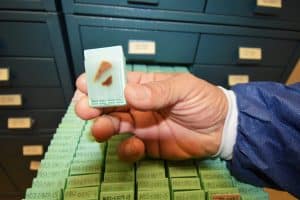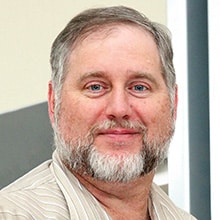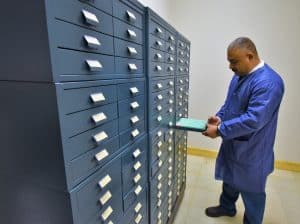Podcast: Play in new window | Download (Duration: 7:57 — 18.6MB)
Subscribe: Apple Podcasts | TuneIn | RSS | More

In the Hixon Hospital, drawers upon drawers hold thousands of animal tissue samples. Protected in wax, this collection is a valuable resource for Texas Biomed scientists and researchers at other institutions that participate in a tissue sharing program.
Scientists who wrote a recent article published in the Journal of Medical Primatology titled “Papio Spp. Colon microbiome and its link to obesity in pregnancy” used tissue samples from the Southwest National Primate Research Center to test a hypothesis: Are there changes in the kinds of bacteria found in obese animals versus normal weight animals? Could those differences influence the outcome of pregnancy?
Obese women at are increased risk of a number of pregnancy complications including gestational diabetes, preeclampsia, and the need for a cesarean delivery.
Edward Dick, Jr., D.V.M., is a veterinary pathologist at the SNPRC who is one of the authors of the article. He explains “the microbiome is a new research area that’s being studied extensively in humans, but no one had really looked at the baboon to see how it compares to the human. This was the first attempt to do that.”

The colon microbiome is made up of trillions of bacteria, fungi and other microbes. It plays an important role in health, including digestion and immunities.
The SNPRC tissue bank provided samples of gut microbiome from four obese pregnant baboons and four normal weight pregnant baboons. These were evaluated by researchers from the College of Medicine at the Texas Tech University Health Sciences Center.
When comparing the samples, scientists noted some differences. For instance, the population of one certain bacterium was increased ten-fold in the obese baboons. Antibodies to this particular bacterium have been associated with metabolic disturbances and insulin resistance in people.
On the flip side, two other bacteria used to help ferment carbohydrates and metabolize fatty acids were reduced in the obese baboons.
The question is whether differences in the colon microbiome could make a difference in the outcome of pregnancy. The short answer is that it’s possible. Much more research needs to be conducted.
The study concludes “changes in the gut microbiome in pregnant obese animals open the venue for dietary manipulation in pregnancy.” If this proves to be the case, researchers may be able to come up with a suitable target for microbiome-related intervention during pregnancy.

The article also acknowledges “the help and dedication of the many excellent animal caretakers, technicians, and veterinarians of the Southwest National Primate Research Center.”
Obesity is a public health concern in the U.S. and around the world. Since the children of obese mothers have a risk of future obesity and heart disease, this kind of research into underlying factors that might be controlled during pregnancy is important.
Dr. Dick says this collaborative research project is a good example of the power of banked tissue for biomedical research. The SNPRC has samples with records on diagnoses that go all the way back to 1988.
Dr. Schlabritz-Lutsevich (Associate Professor at Texas Tech University Health Sciences Center at the Permian Basin) is the Principal Investigator, senior and corresponding author on this study. Study was funded by UTHSCSA, UTHSC and TTUHSC. Dr. Schlabritz-Lutsevich worked closely with the group of Dr. Peter Nathanielsz, who provided continuous support. She assembled the interdisciplinary team, which included Dr. Karen Nelson – the first scientists, who published first microbiome study in 2006, Dr. Christopher Rensing – University of Denmark (in addition to other authors). The help of Dept. of Pathology SNPRC was critical for this research, especially Dr. Edward Dick and Dr. Gene Hubbard.
Dr. Franco Folli is now Professor of Endocrinology, University of Milan, Italy.